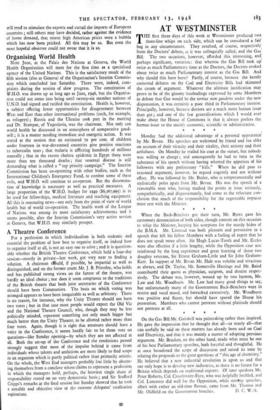AT WESTMINSTER
THE first three days of this week at Westminster produced twol three-line whips on each side, which can be considered a fair, bag in any circumstances. They resulted, of course, respectively i from the Doctors' debate, as it was colloquially called, and the Gas Bill. The two occasions, however, afforded this interesting, and: perhaps significant, variation: that whereas the Gas Bill took up twice as much Parliamentary time as the Doctors, the Doctors evoked, about twice as much Parliamentary interest as the Gas Bill. And why should this have been? Partly, of course, because the keenly, contested debates on the Coal and Electricity Bills had skimmed the cream of argtunent. Whatever the ultimate justification may prove to be of the gloomy forebodings expressed by some Members in debate that Gas would be the tertius non gaudens under the new dispensation, it was certainly a poor third in Parliamentary interest. Principally, however, because doctors are a much more human issue than gas ; and one of the few generalisations which I would ever make about the House of Commons is that it always prefers the human issue to the mainly economic, scientific or administrative.
* * Monday had the additional advantage of a personal appearance'
by Mr. Bevan. His speeches are welcomed by friend and foe alike on account of their vivacity and their vitality, their artistry and their artfulness. On Monday he trailed his coat at the outset, but nobody was willing to charge ; and consequently he had to turn to the substance of his speech without having whetted the appetites of his followers with any preliminary "kills." When he did pass to reasoned argument, however, he argued cogently and not without effect. He was followed by Mr. Butler, who is temperamentally and stylistically poles apart from Mr. Bevan. His was the speech of a reasonable man who, having studied the points at issue seriously, sympathetically, and dispassionately, had come to the reluctant con- clusion that much of the responsibility for the regrettable invasse must rest with the Minister.
* * When the Back-Benchers got their turn, Mr. Byers gave his
customary denunciation of both sides, though content on this occasion to whip the Minister, keeping his scorpions for the sturdy hides of the B.M.A. Mr. Linstead was both pleasant and persuasive in a speech that left his fellow Members with a feeling of regret that he does not speak more often. Sir Hugh Lucas-Tooth and Mr. Eccles were also effective if a little lengthy, while the Opposition case was reinforced by the long experience and great learning of those two doughty veterans, Sir Ernest Graham-Little and Sir John Graham- Kerr. In support of Mr. Bevan Mr. Hale was voluble and vivacious as always, and Dr. Taylor, Mr. Somerville Hastings and Mr. Baird contributed their quota as physician, surgeon, and dentist respec- tively. The debate was, however, wound up by two laymen, Mr. Law and Mr. Woodburn. Mr. Law had many good things to say, but unfortunately many of the Government Back-Benchers were in restive and vocal mood, and barracked extensively. Mr. Woodburn was positive and fluent, but should have spared the House his peroration. Members who cannot perorate without platitude should not perorate at all.
* * On the Gas Bill Mr. Gaitskell was painstaking rather than inspired.
He gave the impression that he thought that all—or nearly all—that can usefully be said on these matters has already been said on Coal and Electricity, and that it was mainly a matter of adopting previous argument. Mr. Bracken, on the other hand, made what must be one of his best Parliamentary speeches, both forceful and thoughtful. He at once broadened the scope of discussion and raised its tone by relating the proposals to the great questions of " this age of chemistry." He believed that a new industrial revolution is upon us and that our only hope is to develop new industries, as there is no future for a Britain which depends on traditional exports. Of later speakers Mr. Peter Roberts, Col. Crosthwaite-Eyre, who was helpfully heckled, and Col. Lancaster did well for the Opposition, while stirring speeches, albeit with rather an old-time flavour, came from Mr. Thomas and
Mr. Oldfield on the Government benches. D. C. W.-S.


































 Previous page
Previous page